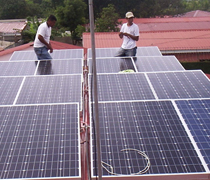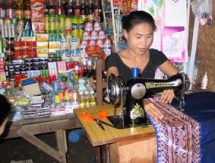Development impact via investments
About a quarter of Finnfund’s investments are channelled to developing countries through private equity funds. Fund investments are targeted mainly at low-income countries, and especially Africa. Finnfund’s fund investments are shown in the project list.
Using funds Finnfund supports mainly small and medium-sized local companies, where funding would be difficult or impossible to arrange directly cost-effectively. Finnfund concentrates on funds that provide capital for business expansion which often could not be implemented without the equity financing provided by funds.
Fund management companies usually have a local presence in their investee countries. Because risk capital for SMEs in low-income countries is a fairly recent phenomenon, the investments are usually made and managed by teams combining equity investment skills obtained in developed markets and a thorough understanding of the local market.
Finnfund has also invested in several sector funds that concentrate on industries such as renewable energy, sustainable forestry or microfinance. These funds typically operate in several countries, transferring skills across borders.
Other development finance institutions often co-invest in these funds with Finnfund. Sometimes insurance companies and pension funds of the investee country are also investing. However, foreign institutional investors do not usually participate until there is track record on successful investments. With the gradual development of a country or sector previously regarded as challenging, private equity investments become established and the funds begin to attract institutional investors too. Then, development finance institutions like Finnfund can move on to finance projects that do not yet have access to sufficient funding from commercial sources.
Funds are typically established for a term of approximately ten years. The fund usually invests the capital raised during the first few years, after which it concentrates on developing its investments and finally on exiting those. Finnfund’s investment commitments to funds vary typically between 5 and 10 million euros. Finnfund participates in a total of 36 funds. At the end of 2012, its fund investments totalled some EUR 68 million, on average about EUR 1.9 million in each.
With fund investments, Finnfund aims at achieving development impacts in developing countries, such as job creation, improvements in productivity and living standards, products of higher quality or lower prices for poor consumers, an improvement in environmental conditions, and a broader tax base. In 2011 the companies funded through Finnfund’s fund investments employed nearly 85,000 people, of which about 8,500 people are attributable to Finnfund’s share.
Most of the funds that invest in developing countries are registered in international financial centres. Funds investing in Africa are often registered in Mauritius. Another much-used country is Luxemburg. These domiciles are conduits, where capital from many different countries is pooled to investee countries. Taxes are not paid in the country where the fund is registered, but the investors and investees pay taxes in their own countries. In 2011 the companies financed by Finnfund via investment funds paid 315 million euros in taxes and similar levies. Finnfund’s allocated share is about EUR 23 million.
Finnfund opposes to tax avoidance, corruption and money laundering in target countries or domiciles. We conduct background checks of fellow investors and fund management companies and require thorough due diligence on fund investee companies and reports on e.g. taxes paid. Alongside many other development finance institutions, we encourage countries of registration to create transparent regimes by investing only in funds registered in countries that comply with the progressively stricter requirements introduced by the OECD Global Forum. In March 2013 there were 13 countries* which no longer are eligible jurisdictions for new fund investments by Finnfund. The list will be revised in the near future after the OECD Global Forum has reviewed some 50 countries in the light of stricter criteria. However some of the countries not currently in compliance are making efforts to get off the list, which is the very purpose of the OECD process and the financial institutions that complying with it.
* Botswana, Brunei Darussalam, Costa Rica, Dominica, Guatemala, Lebanon, Liberia, Marshall Islands, Niue, Panama, Trinidad and Tobago, United Arab Emirates, Vanuatu.



